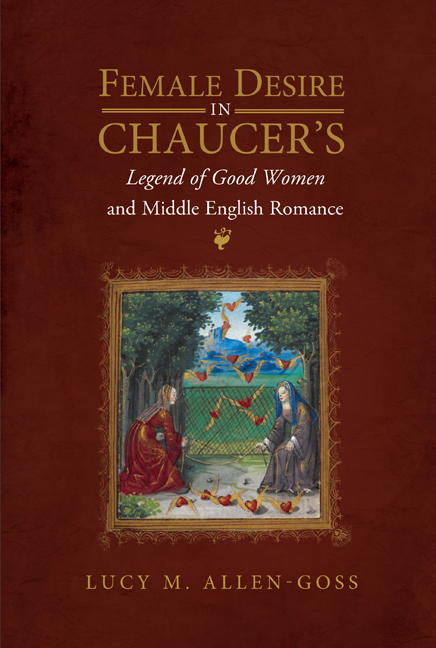Book contents
- Frontmatter
- Contents
- Acknowledgements
- Abbreviations
- Author’s Note
- Introduction: The Origins of Female Desire
- 1 The Silencing of Female Desire in the ‘Legend of Philomela’
- 2 The Traumatised Narrative of the Alliterative Morte Arthure
- 3 ‘As Matter Appetiteth Form’: Desire and Reciprocation in the ‘Legend of Hipsiphyle and Medea’
- 4 Stony Femininity and the Limits of Desire in The Sowdone of Babylon
- 5 Veiled Interpretations and Architectures of Desire in the ‘Legend of Thisbe’ and the ‘Legend of Ariadne’
- 6 Opening Mechanisms, Enclosing Desire: The Erotic Aesthetics of Undo Your Door
- Conclusion: The Ends of Desire
- Bibliography
- Index
- GENDER IN THE MIDDLE AGES
Introduction: The Origins of Female Desire
Published online by Cambridge University Press: 16 September 2020
- Frontmatter
- Contents
- Acknowledgements
- Abbreviations
- Author’s Note
- Introduction: The Origins of Female Desire
- 1 The Silencing of Female Desire in the ‘Legend of Philomela’
- 2 The Traumatised Narrative of the Alliterative Morte Arthure
- 3 ‘As Matter Appetiteth Form’: Desire and Reciprocation in the ‘Legend of Hipsiphyle and Medea’
- 4 Stony Femininity and the Limits of Desire in The Sowdone of Babylon
- 5 Veiled Interpretations and Architectures of Desire in the ‘Legend of Thisbe’ and the ‘Legend of Ariadne’
- 6 Opening Mechanisms, Enclosing Desire: The Erotic Aesthetics of Undo Your Door
- Conclusion: The Ends of Desire
- Bibliography
- Index
- GENDER IN THE MIDDLE AGES
Summary
And the Lord God said: It is not good for man to be alone: let us make him a help like unto himself. … The Lord God cast a deep sleep upon Adam: and when he was fast asleep, he took one of his ribs, and filled up flesh for it. And the Lord God built the rib which he took from Adam into a woman: and brought her to Adam. And Adam said: This now is bone of my bones, and flesh of my flesh; she shall be called woman, because she was taken out of man.
(Genesis 2: 21–23)This passage from Genesis encapsulates the fundamental tensions that attend on medieval representations of female desire. At the moment of his creation, man is complete. His body can only be diminished. But the creation of woman leaves an absence, and she has no fixed definition without reference to that diminished masculinity. Woman is so called, because she was taken out of man. She is constantly defined in the negative and constantly troubled by absences, missing pieces and incomplete beginnings. Her construction follows a prosthetic logic, both in the literal sense that it involves the substitution of one body part (flesh) for another (the rib), and in the epistemic sense Derrida proposes, where the prosthetic is both ‘compensatory and vicarious … an adjunct, a subaltern instance which takes-(the)-place’. A prosthetic both supplements and announces a pre-existing lack, taking the place of what is missing and simultaneously acting as an ever-visible reminder of that lack, by its difference from the substance it replaces. The problem of incompleteness, of prosthetic desire and absent masculine body parts, haunts the imaginary of female desire from Eve onwards.
In a subversive visual twist on the narrative of Genesis, found in a manuscript copied in France in the early fourteenth century, we find the story of the temptation in Eden reflected forwards. In Paris, Bibliothèque nationale de France, MS Fr. 25526, beneath text from Jean de Meun's portion of the Roman de la Rose, there stands a woman clad in a habit and wimple. Beside her, a fruit tree bears a startling crop of pear-like penises that evoke the forbidden apples of the Tree of Knowledge. As the nun reaches for these organs seemingly removed from a male body, her plucking of phallic fruit recalls the moment of Eve's creation from Adam's rib.
- Type
- Chapter
- Information
- Publisher: Boydell & BrewerPrint publication year: 2020



